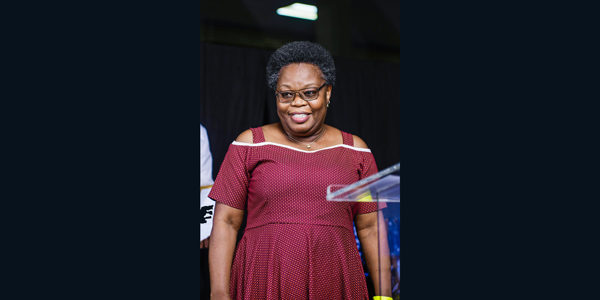Meet Jabu Mashinini, Head of Student Governance
- Wits University
In a world where student activism can be complex and demanding, Mashinini offers a calm and consistent presence.

Mashinini has been at the forefront of student governance at Wits for nearly two decades, navigating the complexities of over 400 student leaders annually, each with their own ideologies, passions, and purpose. She joined Wits in 2005 as the SRC Coordinator when the department was still called Student Development and Leadership Unit (SDLU). In 2015, she was appointed the Head of Student Governance to focus on the affairs of all student formations.
Her role is not a role for the faint-hearted. It requires vision, tenacity, and a deep understanding of student politics, all of which Mashinini brings in abundance. Her academic background in Politics and Psychology, coupled with a Postgraduate Diploma in Management, sets a strong foundation for her demanding role. But it’s her commitment to nurturing ethical, confident, and capable student leaders that defines her legacy. She is known for being service orientated and prizes responsiveness in her Office in order to support students effectively.
Wits Communications had a chat with Jabu Mashinini to learn more about her journey, the purpose of the Student Governance Office, and the evolution of student leadership at Wits.
Q: People often associate you with the SRC. Who are the other student leaders that you work with?
I believe this perception is because of the prominence of the SRC which has to be visible and active all year-round. We do work closely with the SRC and its substructures, which include various student-led bodies across the university.
Each year, we support over 400 individual leaders from a variety of formations, including: Clubs, Societies and Organisations (CSOs), the Postgraduate Association (PGA), School Councils, Faculty Councils, the International Students Sub-Council (ISSC), the All Residence Sub-Council and the Sports Sub-Council.
We oversee elections, conduct capacity building programmes, manage finances, and ensure compliance with all council-related activities and events.
Q: Are there differences among leaders from cultural, sports, and political structures?
Absolutely. Their ideologies and interests differ significantly. Some leaders are highly charged and vocal, while others are more calm and diplomatic. However, we manage these accordingly and uphold fairness.
We are proud that Wits sets a powerful foundation for student leaders to lead with confidence and impact.
Q: What are the main challenges student governance faces at Wits?
One of the biggest challenges is student apathy during elections. While there's been an improvement in voter participation, there’s still a long way to go in encouraging students to elect leaders who can truly make a difference. The political climate in South Africa often affects student governance. Many student leaders subscribe to national ideologies, and at times, misconceptions can derail productive discourse, posing real challenges.
Q: How have Wits students evolved over the years, and how has your office adapted?
The students have evolved drastically over the years, they are bolder without disrespect, and they are claiming the space. We have witnessed academically excellent student leaders since the introduction of the academic requirement threshold for leading. Students are required to have an average of 60% in order to lead and this assist both the student leaders and those they lead to ensure that they prioritise academic success.

